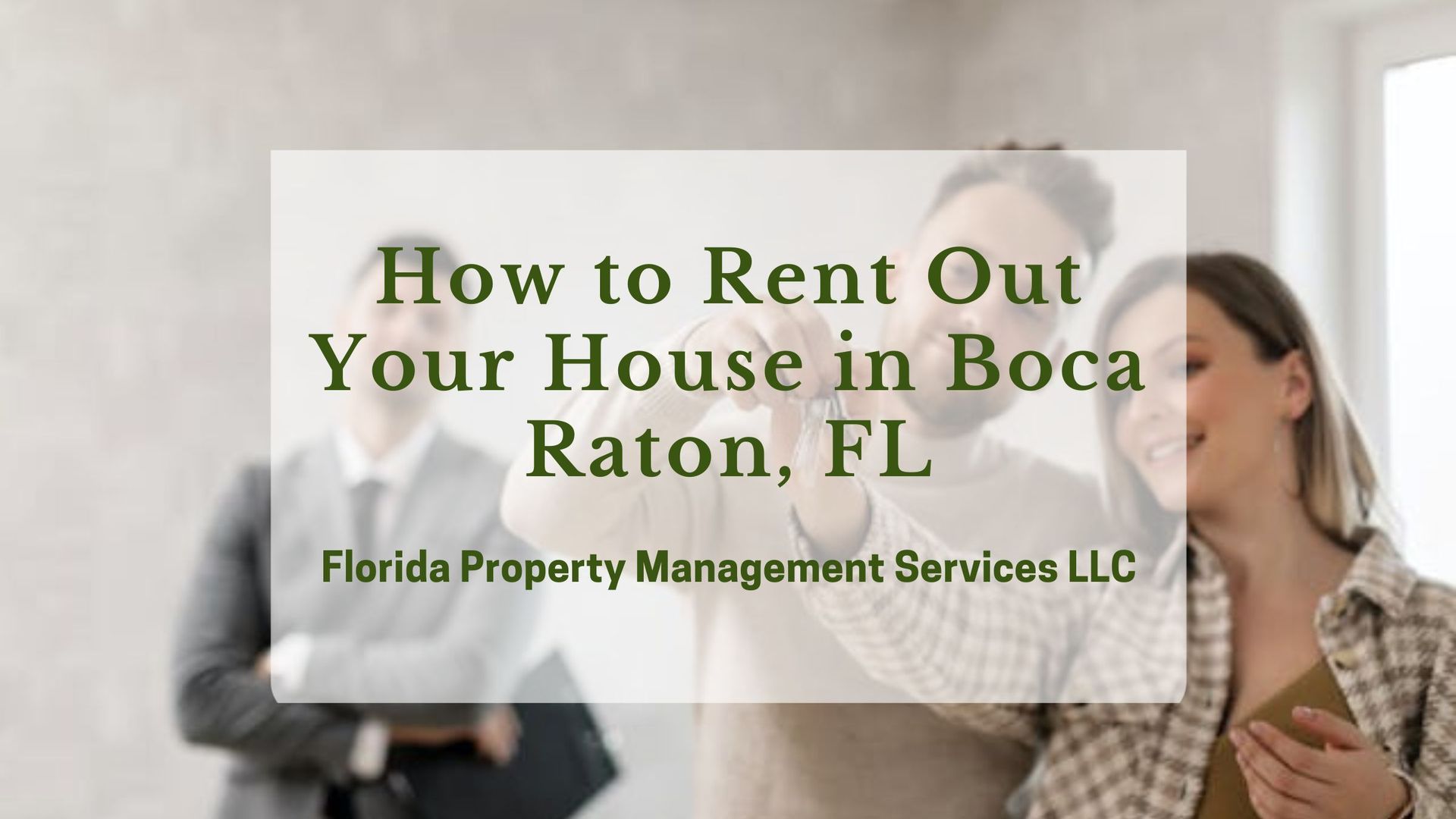How to Rent Out Your House in Boca Raton, FL

With a favorable climate, amenities such as beaches and golf courses, and proximity to major cities like Miami. It's no wonder why Boca Raton is so popular among renters. If you have an empty property or a newly bought unit in Boca Raton, you should consider renting it out!
Rental properties in Florida can be an extremely profitable investment. With a rental property, you can earn a steady passive income through rental payments, which can help cover mortgage payments or grow your real estate portfolio. Additionally, renting out a property allows for potential appreciation in value over time, especially in high-demand areas like Boca Raton where property values have increased significantly over time.
It’s true that there are many risks associated with owning a rental property, including property damage, theft, and financial losses. But don’t worry, the team at Florida PM Services LLC is here to help you! We’ve written this step-by-step guide on how to easily rent out a home in Boca Raton. Keep reading to learn our best tips and tricks for minimizing risks and maximizing the return on your investment!
1. Research the Local Rental Market
Market research and due diligence are crucial when investing. Of course, this also applies to real estate investments. If you’re thinking about buying a rental property in Boca Raton, you must take the time to research the local rental market, including rental rates, vacancy rates, and housing demand trends in the area. This will help you determine whether a particular area or neighborhood is good for rental investments.

On the other hand, if you already own a property in Boca Raton you’re planning to rent out, you should also conduct a thorough market research. Understanding the local rental market will help you set competitive rates for your property and help you ensure you get a good return on your investment.
2. Get Your Property Rent-Ready
Before writing a listing for your Boca Raton rental, you must thoroughly inspect the property. This will help you spot any maintenance issues or repairs that need your immediate attention. After the initial inspection, you must deep clean the property and invest in as many aesthetic upgrades as you can, including landscaping, fresh paint, and minor renovations.
All of this will help your Boca Raton stand out from the rest. After all, a clean and well-maintained property will always be more attractive to prospective tenants. Plus, it shows that you’re a committed landlord, which can help build your reputation in the long run.
3. Invest in Insurance
There are many risks associated with owning a rental property. From property damage caused by tenants or by natural disasters such as floods to tenants missing rent payments on a regular basis, there are a lot of incidents that can cause a dent in your savings. Luckily, you can keep your investment protected by getting the right insurance coverage.
Rental property insurance, commonly known as landlord insurance, typically covers damages to the property caused by covered perils such as fire, theft, vandalism, and certain natural disasters.

It also provides liability coverage in case a tenant or visitor is injured on the property and sues the landlord. Additionally, landlord insurance can include coverage for loss of rental income due to property damage, allowing landlords to mitigate the impact of vacancies or unforeseen events.
4. Invest in Rental Property Marketing
Hundreds of homes are listed for rent in Boca Raton every single day. With so much competition, it can be extremely difficult to make your property stand out from the rest. Luckily, a good marketing strategy can help you.
Successfully
advertising your Boca Raton property will require a lot of time and dedication. But you can rest assured that all your hard work will pay off. By drafting a compelling property listing that includes quality photos, advertising your property online, and conducting property showings and open homes, you can attract a wide pool of prospective tenants for your rental.
5. Screen Potential Tenants
When advertising your Boca Raton rental, you should have interested parties fill out an application form. It should include basic information such as their name, current address, contact information, rental history, employment status, and consent to run a background check.
By gathering all of this information upfront, it’ll be easier to screen potential tenants later on. Your screening process should include credit, rental history, income, and background checks. By
successfully screening tenants, you will keep your Boca Raton property protected at all times from risks such as property damage, evictions, and legal disputes.

6. Draft a Lease Agreement
Once you’ve selected suitable tenants for your rental property, it’s time to begin the leasing process, starting with drafting a rental agreement. The lease agreement for your Boca Raton rental should outline the basic terms and conditions of the tenancy, including the duration, price of rent, maintenance responsibilities of tenants, and any mandatory disclosures.
Additionally, your lease should include relevant provisions, such as security deposit, late fees, pet, and subletting policies to avoid misunderstandings.
Before giving renters the keys to your home, you must ensure that they understand and agree with the terms of the lease. After signing the lease, you can begin with the move-in process.
7. Conduct a Move-In Inspection
Before tenants move into your Boca Raton property, you must conduct a thorough property inspection. Whether you do it yourself or hire a professional inspector, you must ensure that all findings are outlined in a detailed inspection report and, if possible, have been photographed.
This will help you document the condition of your rental at every step of a tenancy. Moreover, it can help you spot signs of
property damage caused by tenants and resolve security deposit disputes later on.
Bottom Line
Successfully renting out a property in Boca Raton, Florida, requires plenty of research, planning, and commitment. You’ll have to research the local market, get your property ready for renters, invest in insurance, screen tenants, and conduct a thorough initial inspection. But you can rest assured that the hard work will pay off, as you’ll be earning a steady passive income in no time!
Need help getting your Boca Raton property leased? Contact
Florida PM Services LLC today! Our team of dedicated property managers will help you get your property rented in no time.













